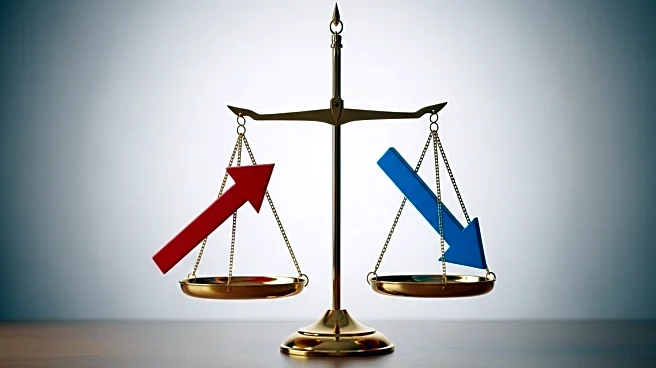What is the story about?
What's Happening?
The U.S. Federal Reserve has announced its first interest-rate cut since December, prioritizing economic growth over inflation control. This decision comes as the risk of higher unemployment becomes more pressing, with the jobless rate rising among key demographic groups such as young adults and minorities. The labor market has been stagnant, with revised figures showing 911,000 fewer jobs added over the past year than initially reported. Wage gains have stalled, and many Americans are living paycheck to paycheck, exacerbating financial strain. The Fed's move aims to stimulate job creation but raises concerns about inflation, which is projected to reach 3% by year-end, surpassing the Fed's 2% target.
Why It's Important?
The Federal Reserve's decision to cut interest rates highlights the delicate balance between fostering economic growth and controlling inflation. This move is significant for low-income households, which are already under strain due to stagnant job creation and rising costs. The end of the 'de minimis' rule, which exempted low-value shipments from tariffs, further burdens these households by increasing the cost of goods. As companies hesitate to hire due to tariff uncertainties, the labor market weakens, impacting consumer spending and economic stability. The Fed's actions could lead to short-term relief but may also contribute to long-term inflationary pressures.
What's Next?
Consumers and businesses are likely to adjust their strategies in response to the Fed's interest-rate cut. Companies may cautiously resume hiring, while consumers might increase spending to lock in current prices before potential inflation hikes. The Fed will continue monitoring economic indicators to balance employment and inflation goals. Stakeholders, including policymakers and financial institutions, will watch for signs of economic recovery or further downturns, influencing future monetary policy decisions.
Beyond the Headlines
The broader implications of the Fed's decision include potential shifts in consumer behavior and business strategies. As inflation concerns grow, consumers may prioritize debt reduction and emergency savings, while businesses might focus on cost management and efficiency. The end of the 'de minimis' rule disproportionately affects low-income and minority households, highlighting the need for targeted economic policies to support vulnerable groups. The Fed's actions underscore the complex interplay between monetary policy, employment, and inflation in shaping economic outcomes.















